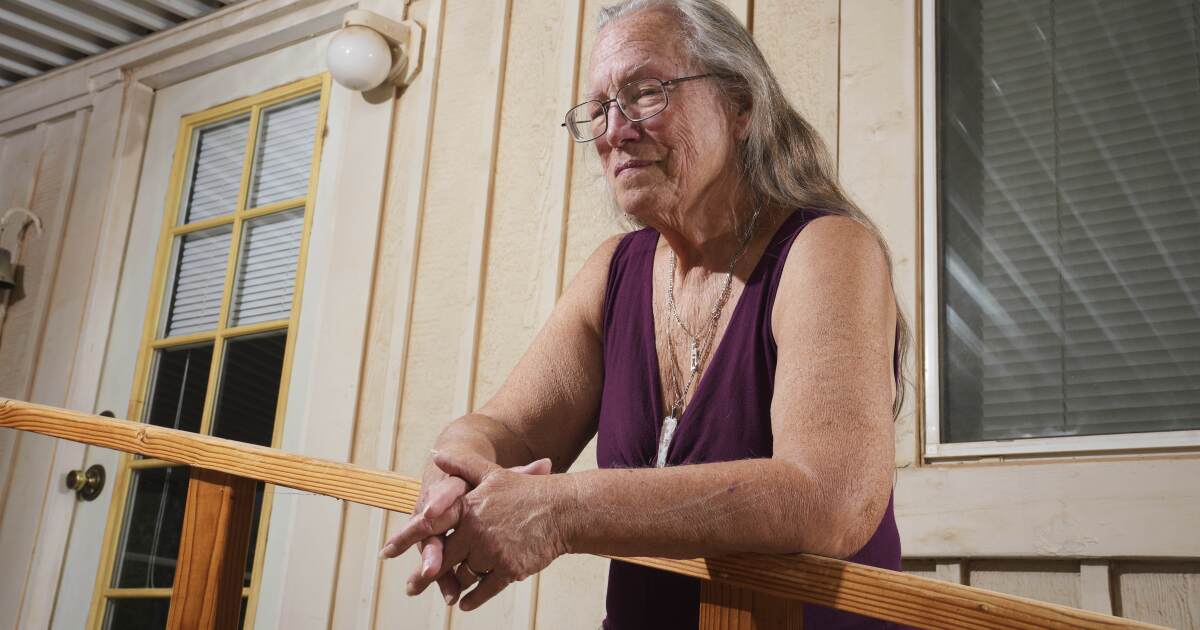Older people in crosshairs as government restarts Social Security garnishment on student loans
NEW YORK — Christine Farro has cut back on the presents she sends her grandchildren on their birthdays, and she’s put off taking two cats and a dog for their shots. All her clothes come from thrift stores and most of her vegetables come from her garden. At 73, she has cut her costs as much as she can to live on a tight budget.
But it’s about to get far tighter.
As the Trump administration resumes collections on defaulted student loans, a surprising population has been caught in the crosshairs: hundreds of thousands of older Americans whose decades-old debts now put them at risk of having their Social Security checks garnished.
“I worked ridiculous hours. I worked weekends and nights. But I could never pay it off,” says Farro, a retired child welfare worker in Santa Ynez, Calif.
Like millions of debtors with federal student loans, Farro had her payments and interest paused by the government five years ago when the pandemic thrust many into financial hardship. That grace period ended in 2023 and, earlier this month, the Department of Education said it would restart “involuntary collections” by garnishing paychecks, tax refunds and Social Security retirement and disability benefits. Farro previously had her Social Security garnished and expects it to restart.
Farro’s loans date back 40 years. She was a single mother when she got a bachelor’s degree in developmental psychology and when she discovered she couldn’t earn enough to pay off her loans, she went back to school and got a master’s degree. Her salary never caught up. Things only got worse.
Around 2008, when she consolidated her loans, she was paying $1,000 a month, but years of missed payments and piled-on interest meant she was barely putting a dent in a bill that had ballooned to $250,000. When she sought help to resolve her debt, she says the loan company had just one suggestion.
“They said, ‘Move to a cheaper state,’” says Farro, who rents a 400-square-foot casita from a friend. “I realized I was living in a different reality than they were.”
Student loan debt among older people has grown at a staggering rate, in part due to rising tuitions that have forced more people to borrow greater sums. People 60 and older hold an estimated $125 billion in student loans, according to the National Consumer Law Center, a six-fold increase from 20 years ago.
That has led Social Security beneficiaries who have had their payments garnished to balloon by 3,000% — from approximately 6,200 beneficiaries to 192,300 — between 2001 and 2019, according to the Consumer Financial Protection Bureau.
This year, an estimated 452,000 people aged 62 and older had student loans in default and are likely to experience the Department of Education’s renewed forced collections, according to the January report from CFPB.
Debbie McIntyre, a 62-year-old adult education teacher in Georgetown, Ky., is among them. She dreams of retiring and writing more historical fiction, and of boarding a plane for the first time since high school. But her husband has been out of work on disability for two decades and they’ve used credit cards to get by on his meager benefits and her paycheck. Their rent will be hiked $300 when their lease renews. McIntyre doesn’t know what to do if her paycheck is garnished.
She floats the idea of bankruptcy, but that won’t automatically clear her loans, which are held to a different standard than other debt. She figures if she picks up extra jobs babysitting or tutoring, she could put $50 toward her loans here and there. But she sees no real solution.
“I don’t know what more I can do,” says McIntyre, who is too afraid to check what her loan balance is. “I’ll never get out of this hole.”
Braxton Brewington of the Debt Collective debtors union says it’s striking how many older people dial into the organization’s calls and attend its protests. Many of them, he says, should have had their debts canceled but fell victim to a system “riddled with flaws and illegalities and flukes.” Many whose educations have left them in late-life debt have, in fact, paid back the principal on their loans, sometimes several times over, but still owe more due to interest and fees.
For those who are subject to garnishment, Brewington says, the results can be devastating.
“We hear from people who skip meals. We know people who dilute their medication or cut their pills in half. People take drastic measures like pulling all their savings out or dissolving their 401ks,” he says. “We know folks that have been driven into homelessness.”
Collections on defaulted loans may have restarted no matter who was president, though the Biden administration had sought to limit the amount of income that could be garnished. Federal law protects just $750 of Social Security benefits from garnishment, an amount that would put a debtor far below the poverty line.
“We’re basically providing people with federal benefits with one hand and taking them away with another,” says Sarah Sattelmeyer of the New America think tank.
Linda Hilton, a 76-year-old retired office worker from Apache Junction, Ariz., went through garnishment before COVID and says she will survive it again. But flights to see her children, occasional meals at a restaurant and other pleasures of retired life may disappear.
“It’s going to mean restrictions,” says Hilton. “There won’t be any travel. There won’t be any frills.”
Some debtors have already received notice about collections. Many more are living in fear. President Trump has signed an executive order calling for the Department of Education’s dismantling and, for those seeking answers about their loans, mass layoffs have complicated getting calls answered.
While Education Secretary Linda McMahon says restarting collections is a necessary step for debtors “both for the sake of their own financial health and our nation’s economic outlook,” even some of Trump’s most fervent supporters are questioning a move that will make their lives harder.
Randall Countryman, 55, of Bonita, Calif., says a Biden administration proposal to forgive some student debt didn’t strike him as fair, but he’s not sure Trump’s approach is either. He supported Trump but wishes the government made case-by-case decisions on debtors. Countryman thinks Americans don’t realize how many older people are affected by policies on student loans, often thought to be the turf of the young, and how difficult it can be for them to repay.
“What’s a young person’s problem today,” he says, “is an old person’s problem tomorrow.”
Countryman started working on a degree while in prison, then continued it at the University of Phoenix when he was released. He started growing nervous as he racked up loan debt and never finished his degree. He’s worked a host of different jobs, but finding work has often been complicated by his criminal record.
He lives off his wife’s Social Security check and the kindness of his mother-in-law. He doesn’t know how they’d get by if the government demands repayment.
“I kind of wish I never went to school in the first place,” he says.
Sedensky writes for the Associated Press.






